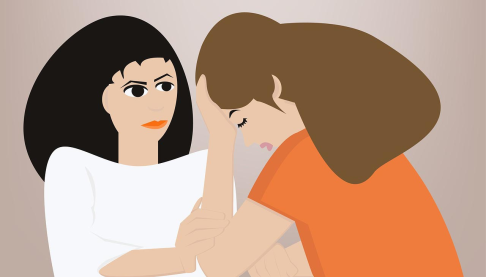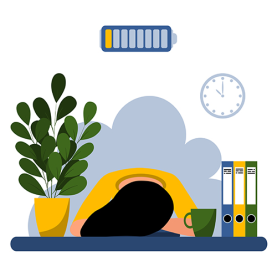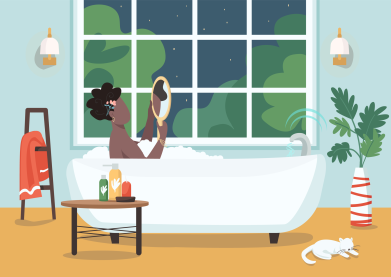The collection provides resources on a range of wellbeing subjects for students studying at Higher or Further Education level. Staff in the Higher and Further Education sector can also use the resources to improve their knowledge of positive health behaviours, building their capacity to support students and supporting Continuing Professional Development.
Importantly, the collection was developed using students’ voices. Students across Wales informed its contents by providing views on OpenLearn materials and significant stressors throughout their student journey. This invaluable input helped identify the most relevant and useful resources needed to support students’ mental health and wellbeing.
In addition to the fundamental input from students, the collection was collated using expert feedback from professional student services, academic and teaching staff across partner institutions. Experts provided critical reflection and suggestions for external resources and signposting to further enhance the collection's impact.
Take a look at the boxes below and begin exploring the collection. Some resources provide direct help for coping with panic attacks or signposting to support services. Whereas others give advice on areas that may impact your mental health such as exercise, time management or digital related stress.
Mae'r casgliad yma hefyd ar gael yn Gymraeg. | This collection is also available in Welsh.

The development of this collection was funded by the Higher Education Funding Council for Wales. It was delivered by The Open University in Wales in partnership with Wrexham Glyndŵr University, Addysg Oedolion Cymru | Adult Learning Wales and The Open University Students’ Association. The contents of the collection were guided by full and part-time students across all three education providers.
-
Do I have mental health problems and should I get some help?
Read now to access more details of Do I have mental health problems and should I get some help?How do we recognise if a reaction to a stressor has developed into a mental health problem? Here's a five point guide...

-
What can I do about my mental health when I don’t have the support I need?
Read now to access more details of What can I do about my mental health when I don’t have the support I need?What can you do if you're not comfortable talking about mental health issues with your peers? Dr Jonathan Leach and Dr Mathijs Lucassen set out six ways of getting the support you need.

-
Time management and study
Read now to access more details of Time management and studyWhether you’re a full or part-time student, studying is likely to mean adding another commitment to your life. Having a lot to balance can sometimes affect our wellbeing and leave us feeling overwhelmed.

-
Panic attacks: what they are and what to do about them
Learn more to access more details of Panic attacks: what they are and what to do about themPanic attacks: what they are and what to do about them is a free course that should be helpful to anyone who experiences panic or panic attacks, for their family and friends, and anyone more generally interested in mental health and mental health treatment. The course starts by exploring formal definitions of panic and panic attack. These ...

-
Exercise and mental health
Learn more to access more details of Exercise and mental healthEach year thousands of pounds are spent on medications to treat conditions such as anxiety and depression. These medications often have negative side effects. Exercise is an alternative treatment that is low cost and has few side effects. In this free course, Exercise and mental health, we will look at the links between exercise and improved ...

-
MSE’s Academy of Money
Learn more to access more details of MSE’s Academy of MoneyThe Open University has joined forces with MoneySavingExpert (MSE) to give you the skills and knowledge to master your finances. Packed with videos, audios, quizzes and activities the course covers all the key aspects of personal finance in six sessions of study that each take around two hours to complete.

-
A Support Net: Can you help someone in need?
Take part now to access more details of A Support Net: Can you help someone in need?All of us will experience personal challenges, but could you make a positive impact on someone's life? Try our wellbeing interactive 'A Support Net' to see if you can help four people.

-
Support for you and your mental health
Read now to access more details of Support for you and your mental healthWith one in four of us experiencing a mental health problem at some point in our lives, it is important that we know where to turn for advice and seek help when we need it.

-
How can I cope with exam stress
Read now to access more details of How can I cope with exam stressThe exam period brings with it extra challenges - but if you manage your stress, you can make it through. Teena Clouston has some tips, and you may turn your papers over now.

-
Five reasons why you should care about mindfulness
Read now to access more details of Five reasons why you should care about mindfulnessMindfulness is about focusing on the present moment, whilst at the same time accepting your feelings, thoughts, and body’s sensations. But why does mindfulness matter?

-
Five tips on how to plan new self-care routines
Read now to access more details of Five tips on how to plan new self-care routinesDr Sharon Mallon explores what is meant by self-care before introducing you to some of the top inexpensive and time-effective ways that you can introduce self-care practices into your life.

-
Journeying through wellbeing: Exploring mental health and wellbeing
Read now to access more details of Journeying through wellbeing: Exploring mental health and wellbeingLife can be a series of ups and downs. Sometimes it can be hard to know if we fully understand what is meant by terms such as mental health and wellbeing. In this article, we will explore these terms and how our mental health and wellbeing is shaped by the things that happen to us

-
Mental health: Tips for mates
Read now to access more details of Mental health: Tips for matesWhat can you do if a friend is suffering? Our survivor has some suggestions. This advice was originally devised with young people in mind but is relevant for any age.

-
Stress and anxiety in the digital age: the dark side of technology
Read now to access more details of Stress and anxiety in the digital age: the dark side of technologyWhat is it about new technology that is making many of us anxious and stressed? Dr Gini Harrison and Dr Mathijs Lucassen explore the top five stressors:

-
Mental health: Survivor suggestions
Read now to access more details of Mental health: Survivor suggestionsAdvice for everyone from our mental health survivor

-
How to manage the digital-related stress of technology
Read now to access more details of How to manage the digital-related stress of technologyHow can we avoid the stress and anxiety associated with the digital age? Dr Gini Harrison and Dr Mathijs Lucassen give us five tips...

-
Mindfulness in mental health and prison settings
Learn more to access more details of Mindfulness in mental health and prison settingsThis free course, Mindfulness in mental health and prison settings, introduces the key ideas and practices of mindfulness, describes how it is helping counselling clients and prisoners, and also looks at some of the criticisms mindfulness has received in recent years.

-
Journeying through Wellbeing
Take part now to access more details of Journeying through WellbeingTake a journey through Wellbeing and see how factors such as where we grow up, what happens to us, and our physical health, can all impact on our mental health and wellbeing.

-
Nutritional psychiatry is the future of mental health treatment
Read now to access more details of Nutritional psychiatry is the future of mental health treatmentIt is time for medical education to take nutrition seriously argues Dr Joyce Cavaye, Senior Lecturer in the School of Health, Wellbeing and Social Care at The Open University.


Rate and Review
Rate this article
Review this article
Log into OpenLearn to leave reviews and join in the conversation.
Article reviews